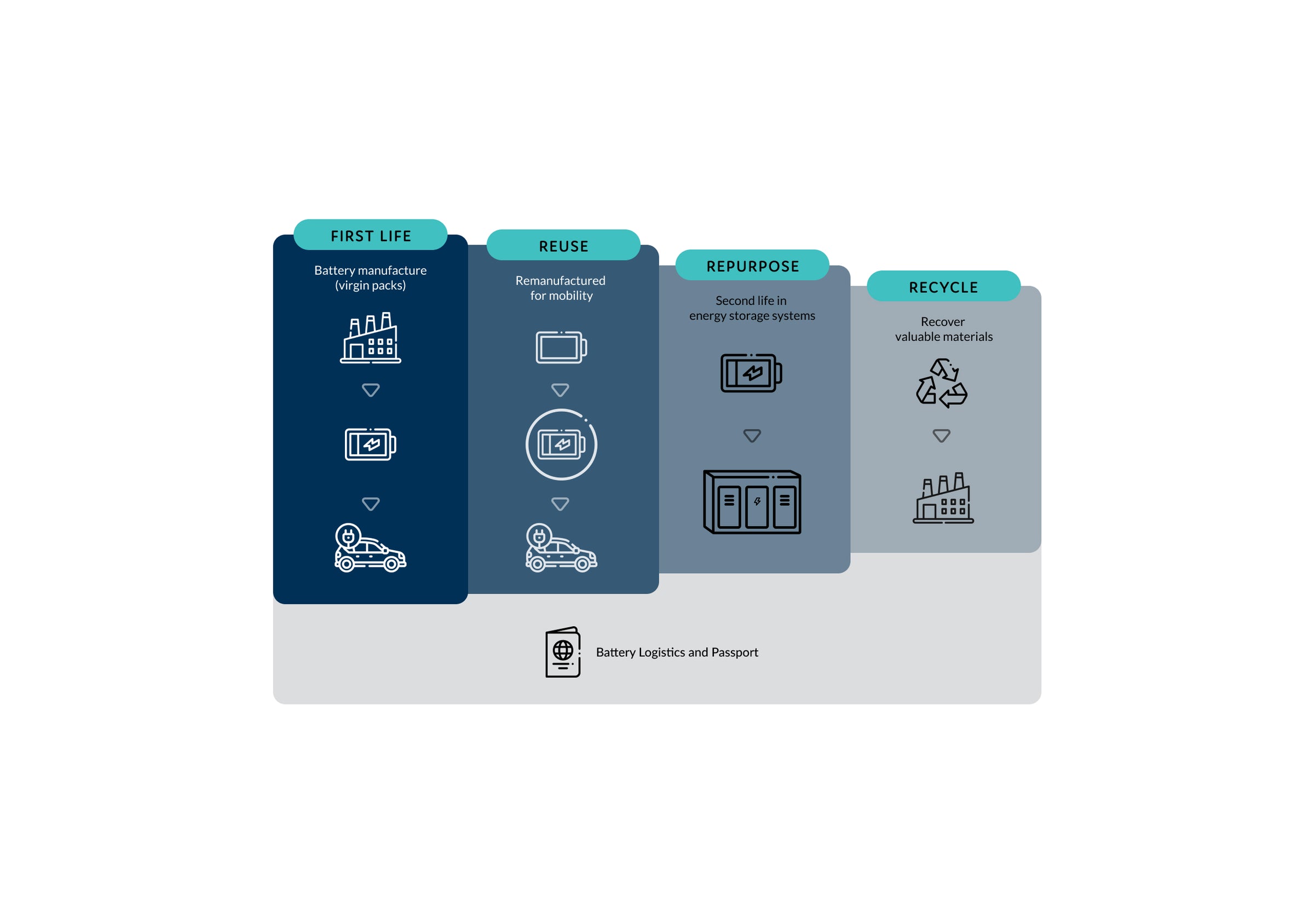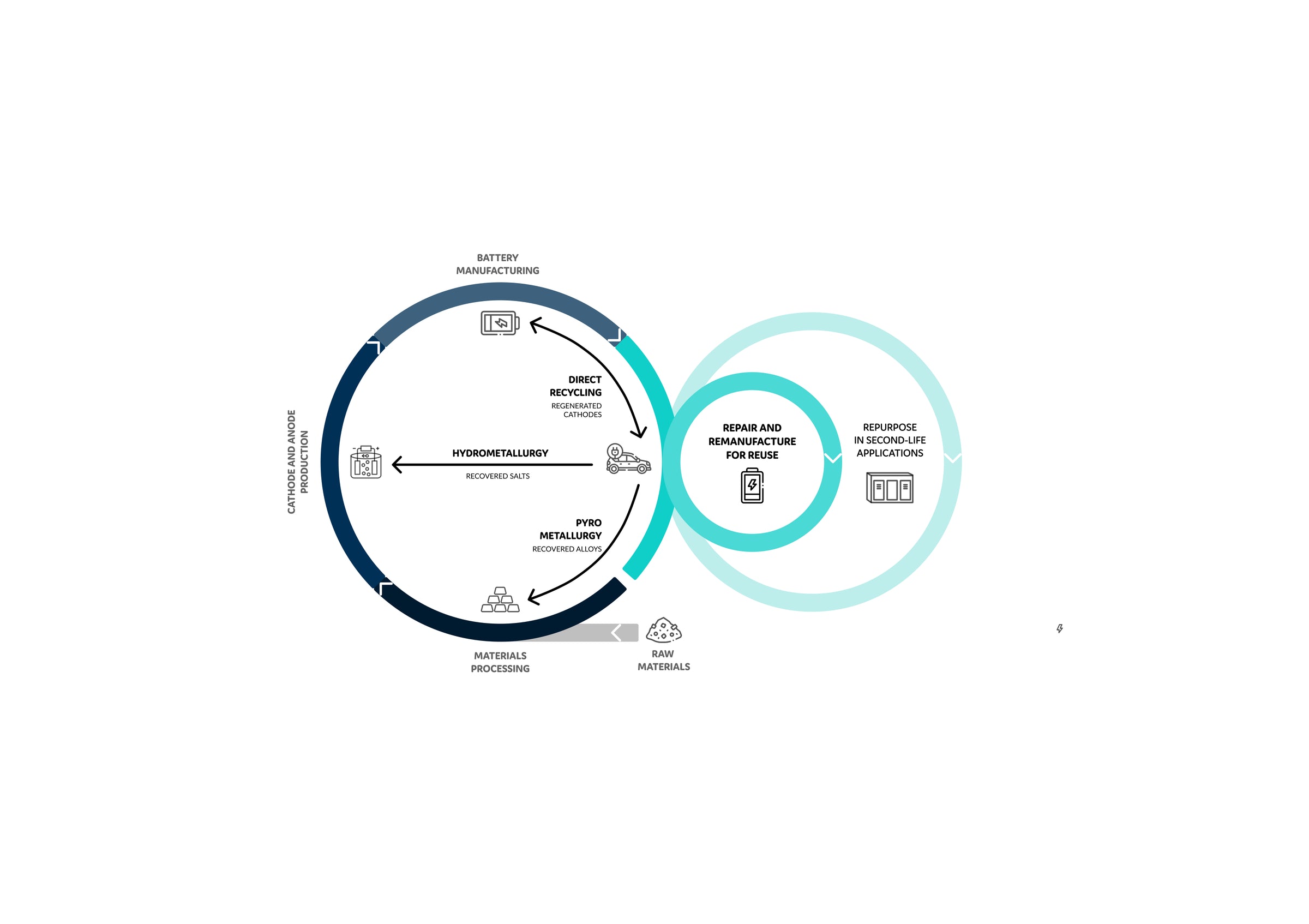Sustainable end of life treatment
Our ambition is to enable infinite EV for a sustainable energy future.
The traditional economy takes materials from earth, makes products from them, and eventually throws them away as waste. The process is linear. A circular economy does away with this linear take-make-waste system. Instead, it focuses on reusing, repurposing, and recycling products and materials. A circular economy is underpinned by a transition to renewable energy and materials, and it decouples economic activity from the consumption of finite resources. This approach creates a sustainable system that is good for business, people, and the environment.
We partner with the automotive industry to create a circular economy for EV batteries. First, we aim to reuse batteries in their original application like hybrid batteries. Second, if we cannot reuse batteries, we repurpose them for new applications like energy storage. Finally, when batteries reach end of life, we recycle them to recover valuable materials that are used to make new batteries. This let's us circulate products and materials at their highest value and eliminate waste.

How it works
So, how do we keep batteries from ending up in landfill? We partner with the mobility industry to create a one-stop shop for the lifecycle management of their batteries. When a battery no longer functions properly in a vehicle, we first conduct a detailed safety inspection. Then we test the performance of the battery pack and modules using our HealthCheck diagnostic. This will determine the next-best use of the battery modules.
Our first aim is to remanufacture the battery so that it can be reused in the vehicle. Over time, the pack will degrade so it is important to monitor its health. When the modules can no longer meet the demands of the vehicle, they may be repurposed for stationary energy storage systems, whether they enter their second life. By comparison, energy storage for commercial and industrial customers is a much gentler life for the batteries compared to that of a traction battery in a vehicle. Remote monitoring ensures that they meet the performance standards of the energy storage system.
Eventually, the batteries will degrade to the point where they can no longer be safely and reliably used for any form of energy storage. At this stage, they are recycled and valuable materials are recovered as inputs for next generation batteries. Throughout the process, we ensure full traceability and zero landfill of battery packs and modules.

Partner spotlight
Let's chat if you'd like to join us on our mission to create a circular economy for EV batteries
The most commonly asked questions about EV batteries
We field lots of questions about EV batteries and the services we provide to repair, reuse, repurpose and recycle them. Sharing is caring, so here goes - a list of the most frequently asked questions.
Can EV batteries be recycled?
Yes, EV batteries can be recycled. Recycling helps recover valuable materials such as lithium, cobalt, and nickel, reducing the environmental impact of battery disposal. However, there is a better way to minimise the environmental impact of EV batteries. The highest value of the battery is by using it in an electric vehicle as a traction battery (that is, to extend the battery's life in its original application). If reuse as traction battery is not possible, then it may be feasible to repurpose the battery to a different application like energy storage systems. These so-called second life batteries spread the manufacturing footprint over many years and defer the need to extract more raw materials from the earth to make new batteries for this second-life market. Our SafetyCheck and HealthCheck services allow us to determine the next-best use of EV batteries once they are taken from the vehicle.
How long do EV batteries last?
Hopefully the battery will last the life of the vehicle. But like any automotive parts, high-voltage electric vehicle batteries can deteriorate over time. The lifespan of EV batteries varies depending on factors such as usage patterns, temperature conditions, and the specific battery chemistry. Generally, most EV manufacturers warranty their batteries for around 8 to 10 years and/or a certain number of miles/kilometers, typically ranging from 160,000 to 200,000 kilometers. Some manufacturers also offer a State Of Health (SOH) guarantee, typically around 70%. SOH measures a battery's maximum charge compared to its rated capacity. For example, a battery with a maximum charge of 56kWh on a rated capacity of 70kWh is 80% (56/70 * 100%). Infinitev's Fast HealthCheck is a fast (3-minute) diagnostic of your EV's battery health (measuring SOH and other relevant health parameters) without the need to remove the battery from the vehicle.
How do I extend the lifespan of my EV battery?
To extend the lifespan of your EV battery, it's important to avoid frequent deep discharges, minimise exposure to extreme temperatures, and use appropriate charging methods. Additionally, keeping the battery within the optimal state of charge (around 20% to 80%) and avoiding frequent fast charging can help prolong its life. If you're unsure about the current condition of your battery, visit your dealer for a scan or talk to us about our Fast HealthCheck - a detailed diagnostic service and battery appraisal in under 10 minutes.
What is the cost of replacing an EV battery?
The cost of replacing an EV battery varies depending on factors such as the vehicle model, battery size, and manufacturer policies. Most electric vehicles in New Zealand and Australia are still under warranty, so check the warranty conditions and contact your dealer if you think the battery might be in need of replacement. If your vehicle is out of warranty, then your local dealer will likely charge you tens of thousands of dollars. The high cost reflects the specialist skill required to do the work, the cost of importing a new battery, and the labour to do the job well. At Infinitev, we are developing a range of replacement batteries for popular vehicles like Mitsubishi Outlander PHEV SUV, Nissan Leaf, and relative newcomers like BYD Atto3 so that EV owners can keep their cars for longer without breaking the bank.
Can I upgrade my EV battery?
We get this question quite a lot, especially from people who own (and love!) early-generation electric vehicles like the first Nissan Leaf. While aftermarket options for EV battery upgrades exist, they may be limited and vary depending on the vehicle make and model. Aftermarket upgrades should be approached with caution, as they may void warranties or compromise vehicle safety and performance. It's important to understand that the entire vehicle is part of the high-voltage system and changing one component, the battery, without updating the other components in the interconnected system may lead to unintended issues. At Infinitev, we prefer to swap like with like - our remanufactured EV batteries are technically identical to the original battery and designed for optimum system performance.
What are the different types of EV batteries available?
And our fave follow-up question - can I change mine from X to Y? Let's answer the main question first. There are several types of EV batteries available, with the most common being some variety of lithium-ion chemistry. Within li-ion, variations include Nickel-Metal Hydride (NiMH) - typically used in older hybrids, Lithium Iron Phosphate (LiFePo4), Lithium Nickel Manganese Cobalt (NMC), and Lithium Cobalt Aluminum Oxide (NCA). Each type has its own characteristics in terms of energy density, cost, and performance. And in the very fast-moving world of battery tech, we see many new chemistries and form factors being explored. At Infinitev, it's our job to keep up with the latest in battery tech, and to be ready with our engineering services to reuse, repurpose and recycle all EV batteries. To answer the change-chemistry question - technically this is possible, but you will likely struggle to find a readily available solution from a reputable battery manufacturer that comes with a decent warranty and proven safety record. Safety has to be your #1 consideration here.
How does fast charging impact EV battery health?
Fast charging, while convenient, can impact EV battery health over time due to increased heat generation and stress on the battery cells. Frequent use of fast chargers may accelerate battery degradation, leading to reduced capacity and lifespan. We'd recommend to use fast charging sparingly and prioritise slower charging methods for daily use.
What is the expected degradation of EV batteries over time?
There is no hard and fast rule here. The degradation rate of EV batteries varies depending on factors such as battery chemistry, usage patterns, and environmental conditions. On average, EV batteries may lose around 2-3% of their capacity per year, although newer battery technologies and improved thermal management systems are reducing degradation rates in modern EVs.
How does regenerative braking affect EV battery life?
Regenerative braking, which captures and stores energy during braking or coasting, can help extend EV battery life by reducing wear on the brake pads and minimising energy loss. However, frequent use of regenerative braking at high speeds or on steep descents may increase the thermal load on the battery, potentially impacting its longevity. What's that phrase again? Too much of a good thing...
Can extreme temperatures affect EV battery performance?
Yes, extreme temperatures, both hot and cold, can affect EV battery performance and lifespan. High temperatures can accelerate battery degradation, while cold temperatures can reduce range and efficiency. It's essential to park your EV in shaded areas during hot weather and pre-condition the battery in cold weather to mitigate these effects.
Did we miss a question? Get in touch!












